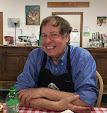YES, my kitchen window is open.
Opening that window is my way of saying "Hurrah, the warm weather is
here." I open it in mid-April and expect to keep it open until
mid-October (except for short closings during summer thunderstorms.)
I always liked opening a window or two in Bill's Coffeeshop for the
same reasons. It's a wonderful statement.
But it's risky to leave a window open too long in the coffeeshop.
Outdoor life tends to creep in. Over the years birds, squirrels, cats
and even a rabbit have found their way in through open windows.
It's really not so bad, I suppose, that they want to come in. The
problems come when they want to leave. The birds and other animals
tend to get upset when they can't find an exit. And that leads to
upset two-legged customers. And that leads...well, you get the idea.
ONE OF the more remarkable spring incidents in recent years involved a
bird. The bird came in, flew around -- even landed on a table. She
seemed to be having a really good time.
But when it came time to leave, the bird couldn't find the open
window. She kept flying into the glass of other windows.
Of course, she got upset. In turn, the customers got upset, too. But
no one could figure out what to do.
Then something amazing happened. One of the student volunteers in the
coffeeshop stepped forward and caught the bird with her bare hands. She
sat down with the bird for a few moments and talked gently to her --
assuring the bird everything would be all right.
Then she walked over to the open window, opened her hands and let the
bird. go. At first, I thought this seemed like the kind of thing
Francis of Assisi would do. But after a moments reflection, I realized
it was just the sort of thing Bill would have done. Once again, the
spirit of Bill was among us.
NOW, I'm not one who believes in ghosts or visions. So I don't expect
to hear Bill some evening on the third floor of North Hall or see him in a
Santa suit just outside the door of the building.
But I have grown to believe that his spirit is with us in the
coffeeshop -- and in a thousand other places where people have heard
about Bill's life and spirit. I have been collecting stories about his
spirit at work. I'll be retelling some of those in the coming weeks.
I want to hear some of your stories, too. So here's your invitation to
pass along stories about the spirit of Bill Sackter at work in your
life. You can send them to the Newsletter by clicking reply and then
writing. Or you can send them to me at: tomgilsenan@gmial.com
-- Tom Gilsenan
STAY IN TOUCH
WITH POVERTY
Ralph Siddall, a longtime Newsletter reader, recently sent along some
reflections based on his experience serving dinner at Shelter House,
the homeless shelter in Iowa City. This excerpt from his insights are
a reminder how important it is to "stay in touch with poverty." It is
so easy to forget those in our midst who don't have enough to eat
today or a place to stay tonight.
...I am thinking about the dinner we served earlier this evening to
the residents of Shelter House. There were a couple of people in
particular who stand out.
THERE was Fred, an older resident who was only fully understood
through interpreting the gestures he was making. Fred kept coming into
the kitchen to stir things, making it known that he was a cook at some
point in his life. The staff kept coming in to shoo him out, but he
was pretty persistent, and would slip back in as soon as they left. We
thought it best to just let him stir; he was actually helping as far
as I was concerned. After the dinner, I asked him how the food was:
"Gravy was kinda lumpy." I'll bet he thought it was under-stirred.
Another standout was a young man named Ralph, who lives at Shelter
House with his fiance and his four month old baby. He wanted some
gravy on the side for the baby, as they had the child eating
semi-solid food. Apparently, it helps babies sleep if there is some
solid food in their stomachs. Ralph, too, is a poet. He has his poems
printed and collected in a three ring binder says says a publishing
House is going to publish them. One of his poems, which he insisted he
read to us (but only after telling us about his travels and his
relationship with God) exhibited a very complex structure. I gave him
my cell phone number and told him if he called me I would arrange to
have him come on the radio to read some of his work.
When all was said and done, there was a real mixed bag of feelings
from the night. I am absolutely convinced that I got back as much, if
not more, than I gave. I am also humbled by the gratitude and warmth
we were shown that evening. We worked on the meal, but even so, I did
not expect the reaction I got from people there that night. For
example, I do not think I have ever heard the words "sweet potatoes"
said with such passion and desire.
I SAY mixed because I am dismayed by the fact that the gratitude I was
shown comes, in large part, from the fact that society has basically
forgotten these folks. Why do we only think of them at holiday times
of the year. It's as if the other 364 days don't matter. Why can't we
have "season's greetings" every day of the year?
-- Ralph Siddall

